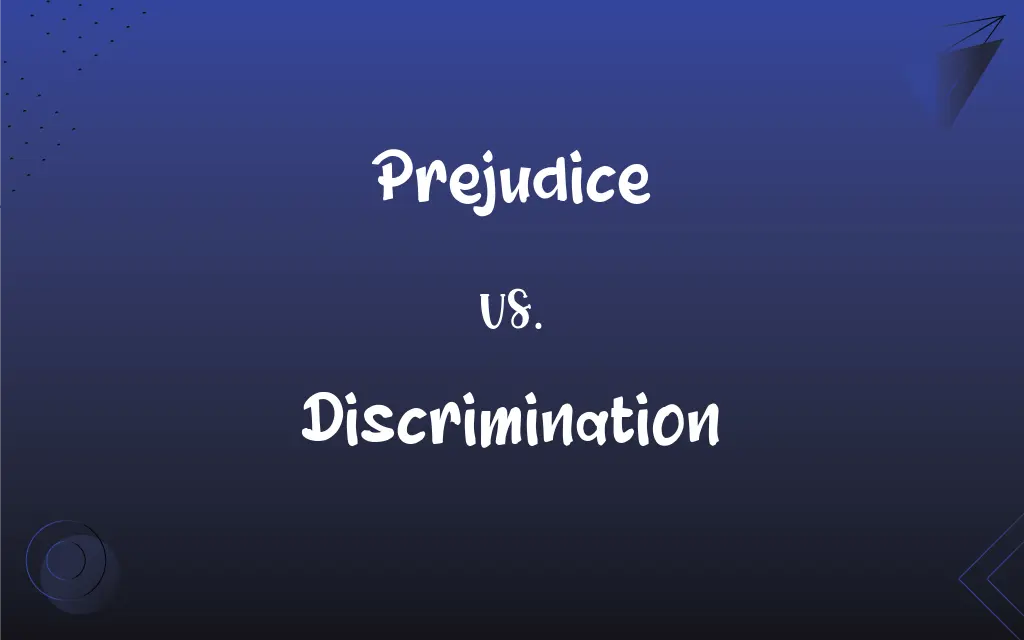Prejudice vs. Discrimination: What's the Difference?
Edited by Janet White || By Harlon Moss || Updated on October 18, 2023
Prejudice is a preconceived opinion or bias, while discrimination is the unjust treatment based on such biases.

Key Differences
Prejudice refers to a preconceived notion or bias towards an individual or group without valid reasoning. Discrimination, on the other hand, involves acting on these biases, leading to unjust treatment of certain individuals or groups.
One can hold prejudice internally without displaying it externally. However, discrimination is always an external action, stemming from prejudicial beliefs, which affects individuals or groups negatively.
While prejudice exists in the realm of thoughts and feelings, discrimination manifests in actions or decisions that favor or disfavor certain groups over others.
It's essential to understand that a person can be prejudiced without necessarily acting discriminatively. Conversely, discrimination always arises from some form of prejudice.
In essence, prejudice is the seed, the internal belief system, while discrimination is the tree, the external manifestation of those beliefs in behavior or practices.
ADVERTISEMENT
Comparison Chart
Nature
Internal bias or belief
External action or behavior
Manifestation
In thoughts and feelings
In actions or decisions
Dependency
Can exist without leading to discrimination
Always stems from prejudice
Impact
Might not directly affect others
Directly affects individuals or groups negatively
Example
Believing a stereotype
Denying someone a job based on that stereotype
ADVERTISEMENT
Prejudice and Discrimination Definitions
Prejudice
An irrational dislike or favoritism toward a group.
His prejudice towards musicians stemmed from outdated beliefs.
Discrimination
Action based on prejudice or bias against a certain group.
Gender discrimination remains a significant issue globally.
Prejudice
A preconceived opinion not based on reason or experience.
His prejudice against outsiders made him wary of new neighbors.
Discrimination
Making a distinction in favor of or against a person or thing based on group, class, or category.
Racial discrimination can lead to societal divides.
Prejudice
A negative attitude towards someone based on their race, religion, or other factors.
Age prejudice can affect hiring decisions.
Discrimination
Unfair treatment of individuals based on prejudice.
Discrimination in the workplace can hinder career progression.
Prejudice
A bias or judgment formed before knowing the facts.
Jane's prejudice against fast food didn't allow her to try it.
Discrimination
Behavior that treats individuals unequally because of their characteristics.
Religious discrimination can disrupt communal harmony.
Prejudice
Holding stereotypes about an individual or group.
Cultural prejudice can lead to misunderstandings.
Discrimination
The act of denying rights or benefits due to prejudice.
Discrimination on the basis of disability is prohibited by law.
Prejudice
The act or state of holding unreasonable preconceived judgments or convictions
“This is not actually a volume of the best short stories … These are just the stories that I like best, and I am full of prejudice and strong opinions” (Ann Patchett).
Discrimination
The act of discriminating.
Prejudice
An adverse judgment or opinion formed unfairly or without knowledge of the facts
A boy with a prejudice against unfamiliar foods.
Discrimination
The ability or power to see or make fine distinctions; discernment.
FAQs
Which is an internal belief system?
Prejudice.
Is all discrimination based on prejudice?
Yes, discrimination stems from prejudicial beliefs.
Which involves making judgments without all the facts?
Prejudice.
What's an example of discrimination?
Denying someone housing based on their race.
Can institutions be prejudiced?
Institutions can uphold prejudiced beliefs and practices, often termed as institutional bias.
Is discrimination always obvious?
No, it can be subtle or overt.
How does prejudice affect society?
It can lead to divisions, misunderstandings, and conflicts.
Is discrimination always intentional?
Not always. There can be unintentional or systemic discrimination.
Can one action be both prejudiced and discriminatory?
Yes, if it's based on a prejudiced belief and results in unfair treatment.
What drives prejudice?
Multiple factors, including upbringing, culture, experiences, and misinformation.
Which manifests in external actions?
Discrimination.
How can discrimination be addressed?
Through education, legislation, and awareness campaigns.
Where can discrimination occur?
Almost anywhere, including workplaces, schools, public places, etc.
Why is it essential to understand the difference between the two?
To effectively address and combat issues related to bias and unfair treatment in society.
Can you be prejudiced without being discriminatory?
Yes, one can hold prejudices without acting on them.
Is it illegal to discriminate in hiring practices?
Yes, such discrimination is illegal in many jurisdictions.
Can prejudices change over time?
Yes, with exposure and education, prejudices can change.
What's an example of prejudice?
Believing a stereotype about a certain ethnic group.
Can discrimination be both positive and negative?
While typically negative, there are debates on "positive discrimination" like affirmative action.
Does prejudice always lead to discrimination?
No, not all prejudiced beliefs result in discriminatory actions.
About Author
Written by
Harlon MossHarlon is a seasoned quality moderator and accomplished content writer for Difference Wiki. An alumnus of the prestigious University of California, he earned his degree in Computer Science. Leveraging his academic background, Harlon brings a meticulous and informed perspective to his work, ensuring content accuracy and excellence.
Edited by
Janet WhiteJanet White has been an esteemed writer and blogger for Difference Wiki. Holding a Master's degree in Science and Medical Journalism from the prestigious Boston University, she has consistently demonstrated her expertise and passion for her field. When she's not immersed in her work, Janet relishes her time exercising, delving into a good book, and cherishing moments with friends and family.
































































